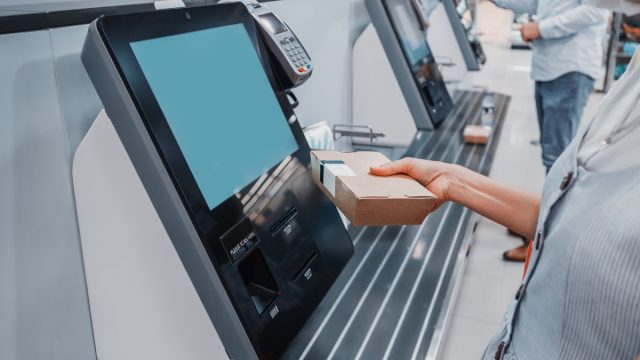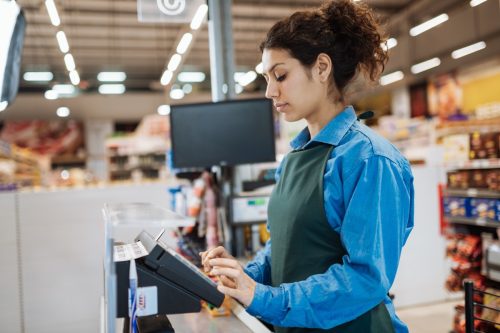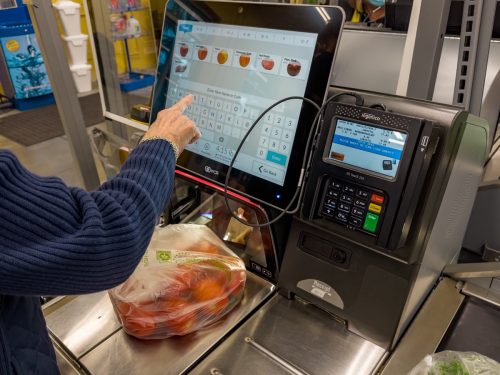Lawmakers Are Fighting Against Self-Checkout Kiosks at Grocery Stores

Depending on the kind of shopper you are, you either intentionally seek out self-checkout lanes, or you make sure to head to a cashier instead. With the latter option, you get the benefit of some conversation—and maybe some details about a sale—but some people just prefer to scan and bag their items themselves. There’s been plenty of conversation around the security concerns associated with self-checkout, and now, local and state officials are getting involved. Read on to find out why lawmakers are fighting to limit self-checkout kiosks at grocery stores.
RELATED: Walmart Worker Issues Warning to Shoppers About Self-Checkout.
An elected official in Illinois wants to tax retailers with self-checkout.

Over the past several months, officials have proposed legislation that would limit some aspects of self-checkout. Last week, Devon Reid, the eighth ward council member in Evanston, Illinois, proposed an annual tax for retailers that use self-checkout in-store, the Evanston RoundTable reported.
According to the outlet, Reid proposed that retailers be taxed $5,000 per kiosk, with that money then used for “training and placement programs” for teenagers in Evanston. Reid clarified that he is not looking to place young adults in jobs at bigger retailers or grocery stores, but at smaller operations.
“The goal is to take that revenue and get teens jobs at small businesses,” he said at the Aug. 17 meeting, noting the decline in human cashiers and that “prices have not gone down” even with more self-checkout options. Reid also called out Amazon Go stores, which allow you to “just walk out” and pay through your Amazon account, with no checkout process at all.
“At some point, those jobs will be eliminated completely, and the money goes right into Jeff Bezos’ pocket,” Reid said.
RELATED: Walmart Shoppers Threaten to Boycott Over Self-Checkout Change.
This isn’t the first time self-checkout has been challenged.

While Reid’s proposal would be limited to the Illinois area he serves, another lawmaker in Rhode Island proposed a similar idea for constituents earlier this year.
In a Jan. 27 press release, Democratic representative Megan Cotter introduced a bill (2023-H5161), which would limit the number of self-checkout kiosks at grocery stores to no more than eight. It would also require stores to give customers a 10 percent discount if they use self-checkout for orders with 10 or more items.
“Self-checkout is a way grocery stores are avoiding paying employees by getting customers to do cashiers’ jobs for free. It seems only fair that if they are going to take on cashiers’ work, the customer should get something in return,” Cotter said.
RELATED: Shoppers Slam Self-Checkout Tipping Requests: “Stop This Madness.”
The bill received pushback.

Cotter alleged that self-checkout is taking away jobs, and the bill describes a series of other drawbacks, including a lack of social connection, increased risk for shoplifting, the associated difficulty for elderly customers and those with disabilities, as well the effect on retail workers, who feel “devalued.”
“In addition to the frustration and inconvenience self-checkouts represent to many shoppers, this is mainly a jobs issue. Self-checkouts are specifically used to reduce the number of people that stores employ, and the number of hours that their employees work,” Cotter said in a press release.
Cotter stated she wanted the bill to prompt conversation, adding that grocery chains would likely hope for shoppers to just accept more self-checkout lanes. According to The Providence Journal, the bill was indeed met with opposition from grocery chains.
The proposed law didn’t sit well with these businesses, with owners saying that customers look for self-checkout options and are accustomed to seeing and using them. The bill did not end up passing, according to BillTrack50. It was recommended to be “held for further study” in February, and reported as dead on June 16.
RELATED: For more up-to-date information, sign up for our daily newsletter.
Some chains are shifting to self-checkout-only stores.

While some are fighting against self-checkout and its potential impacts on job opportunities, these kiosks are probably here to stay. Some retailers are simply upping their numbers, while others are doing away with cashiers entirely.
As Best Life previously reported, Dollar General announced plans to test the exclusive self-checkout model last year due to its popularity with customers. And this summer, a Kroger store in Franklin, Tennessee, is piloting a self-checkout-only store.
But following news of the conversion at Kroger, NBC News reported that not all shoppers are thrilled with the increase in self-checkout machines. “I hate self-checkout. Those machines do not work,” a customer at Stew Leonard’s (a regional grocery chain in New York) told the outlet.
Another shopper added, “Last resort. Last resort for me.”
At the end of the day, Phil Lempert, Supermarket Guru founder and editor, told NBC News that grocery chains may not be happy with the shift either.
“I don’t think there’s one shopper in the nation who would like to go to an all-self-checkout-store,” Lempert said. “And frankly, as these retailers are putting in more stores that are only self-checkout, I think their sales are going to decline.”